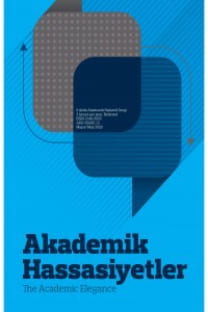ÜRETİM VE HİZMET İŞLETMELERİNDE ÖRGÜTSEL MUHALEFET ALGISININ ÖLÇÜLMESİ
Örgütsel Muhalefet, Üretim, Hizmet, Algı, Muhalefet
MEASURING PERCEPTION OF ORGANIZATIONAL DISSENT IN MANUFACTURING AND SERVICE BUSINESSES
Organizational Dissent, Manufacturing, Service, Perception, Dissent Örgütsel Muhalefet, Üretim, Hizmet, Algı, Muhalefet,
___
- Aktan, C. C. (2015). Organizasyonlarda yanlış uygulamalara karşı bir sivil erdem, ahlaki tepki ve vicdani red davranışı: Whistleblowing. Organizasyon ve Yönetim Bilimleri Dergisi , 7(2) , 19-36
- Ardoğan, R. (2004). Teorik temeller ve tarihsel gerilimler arasında islam kültüründe siyasal muhalefet, Cumhuriyet Üniversitesi İlahiyat Fakültesi Dergisi, 8 (2), 171-189.
- Atac, L. O. & Kose, S. (2017). The relationship between organizational democracy and organizational dissent: A Research on white collar workers. Istanbul University Journal of the School of Business, 46(1), 117-132.
- Brown, M. E., Treviño, L. K. & Harrison, D. A. (2005). Ethical leadership: A social learning perspective for construct development and testing. Organizational Behavior And Human Decision Processes, 97(2), 117-134. https://doi.org/10.1016/j.obhdp.2005.03.002
- Demiryürek, M. (2019). Algılanan örgütsel adalet ile örgütsel muhalefet arasındaki ilişkiyi belirlemeye yönelik bir araştırma. [Yayınlanmamış yüksek lisans tezi]. Nevşehir Hacı Bektaş Veli Üniversitesi, Nevşehir.
- Eroğlu, Ş. G. & Alga, E. (2017). Impact of organizational dissent on organizational change: a research on organizations in service sector. Uluslararası İktisadi ve İdari Bilimler Dergisi, 3(40), 150-158. https://doi.org/10.29131/uiibd.349482
- Garner, J. T. (2006). When things go wrong at work: Expressions of organizational dissent as interpersonal influence. [Unpublished Doctoral Thesis]. Texas: A&M University.
- Garner, J. T. (2013). Dissenters, managers, and coworkers: The process of co-constructing organizational dissent and dissent effectiveness. Management Communication Quarterly, 27, 373-395. https://doi.org/10.1177/0893318913488946
- Garner, J. T. (2018). Dissent. R. L. Heath, & W. Johansen, The international encyclopedia of strategic communication. New Jersey: JohnWiley & Sons, Inc.
- Gorden, W. I. (1988). Range of employee voice. Employee Responsibilities and Rights Journal, 4, 283-299. Kassing, J. W. (1997). Articulating, antagonizing, and displacing: A model. Communication Studies, 48(4), 311-332. https://doi.org/10.1080/10510979709368510
- Kassing, J. W. (1998). Development and validation of the organizational dissent scale. Management Communication Quarterly, 12, 183-229. https://doi.org/10.1177/0893318998122002
- Kassing, J. W. (2000). Investigating the relationship between superiorsubordinate relationship quality and employee dissent. Communication Research Reports, 17, 58-70. https://doi.org/10.1080/08824090009388751
- Kassing, J. W. & Armstrong, T. A. (2002). Someone’s going to hear about this: Examining the association between dissent-triggering events and employees’ dissent expression. Management Communication Quarterly, 16(1), 39-65. https://doi.org/10.1177/0893318902161002
- Kassing, J. & DiCioccio, R. L. (2004). Testing a workplace experience explanation of displaced dissent. Communication Reports, 17(2), 113-120. https://doi.org/10.1080/08934210409389380
- Kassing, J. W. & Kava, W. (2013). Assessing disagreement expressed to management: Development of the upward dissent scale. Communication Research Reports, 30(1), 46-56. https://doi.org/10.1080/08824096.2012.746225
- Kul, Ö. B. (2022). Öğretim elemanlarının örgütsel muhalefet davranışlarına ilişkin bir çözümleme: Nedenleri, biçimleri ve sonuçları. [Yayınlanmamış doktora tezi]. Gazi Üniversitesi, Eğitim Bilimleri Enstitüsü, Ankara.
- Müceldili, B., Tatar, B. & Erdil, O. (2021). Organizational dissent, organizational culture and communication: a conceptual framework. In C. Zehir, A. Kutlu, & T. Karaboğa (Eds.), Leadership, Innovation, Media and Communication, vol 101. European Proceedings of Social and Behavioural Sciences (pp. 37-46). European Publisher. https://doi.org/10.15405/epsbs.2021.02.4
- Özdemir, M. (2010). Ankara İli Kamu Genel Liselerinde Görev Yapan Yönetici ve Öğretmenlerin Örgütsel Muhalefete İlişkin Görüşleri, [Yayımlanmamış doktora tezi]. Ankara Üniversitesi Eğitim Bilimleri Enstitüsü. Ankara.
- Parker, L. E. (1997). Silent dissenters: A model for exploring the sources and consequences of. Academy of Management Proceedings, 71-75. https://doi.org/10.5465/ambpp.1997.4980829
- Redding, W. C. (1985). Rocking boats, blowing whistles, and teaching speech communication. Communication Education, 34, 245-258. https://doi.org/10.1080/03634528509378613
- Rothschild, J. & Miethe, T. D. (1994). Whistleblowing as resistance in modern work organizations: The politics of revealing organizational deception and abuse. Edited J. Jermier; D. Knights ve W. Nord, Resistance And Power In Organizations, Routledge, London, 252-273.
- Saygan, S. & Bedük, A. (2013). Ahlaki olmayan davranışların duyurulması (whistleblowing) ve etik iklimi ilişkisi üzerine bir uygulama. Dokuz Eylül Üniversitesi İktisadi İdari Bilimler Fakültesi Dergisi, 28(1), 1-23.
- Schram, E. (2021, July 14). How to build a strong organizational culture. Retrieved from https://www.forbes.com/sites/forbesbusinesscouncil/2021/07/14/how-to-build-a-strong-organizational-culture/ on 23.03.2023
- Shahinpoor, N. & Matt, B. F. (2007). The Power of one: Dissent and organizational life. Journal of Business Ethics, 74, 37-48. https://doi.org/10.1007/s10551-006-9218-y
- Sprague, J. A. & Ruud, G. L. (1988). Boat-rocking in the high technology culture. American Behavioral Scientist, 32, 169-193.
- Stewart, L. P. (1980). “Whistle Blowing”: Implications for organizational communication. Journal of Communication, 30(4), 90-101.
- Theodore A. Avtgis , Candice Thomas-Maddox , Elycia Taylor & Brian R. Patterson (2007) The Influence of employee burnout syndrome on the expression of organizational dissent, Communication Research Reports, 24(2), 97-102, https://doi.org/10.1080/08824090701304725
- Yıldırım, M. (2020). Çalışanların örgütsel demokrasi algılarının örgütsel muhalefet davranışı ve işle bütünleşme düzeyine Etkisi: Bir Alan Araştırması. [Yayınlanmamış doktora tezi]. İnönü Üniversitesi, Sosyal Bilimler Enstitüsü, Malatya.
- Zeng, C., Permyakova, T. M., Smolianina, E. A. & Morozova, I. S. (2020). Exploring the relationships between employee burnout, organizational dissent and work-family culture in Russian organizations. Journal of Intercultural Communication Research, 49(2), 119-132. https://doi.org/10.1080/17475759.2020.1719430
- ISSN: 2148-5933
- Yayın Aralığı: 3
- Başlangıç: 2014
- Yayıncı: A Kitap
SOSYOTELİZM: FARKLI BAĞLAMLARDA BİR DEĞERLENDİRME
Itır HASIRCI, Edip ÖRÜCÜ, Pınar KURT
KUZEY MAKEDONYA CUMHURİYETİ'NDE HÜKÜMET ÜZERİNDEKİ PARLAMENTO KONTROLÜ
Martina ZHUZHELOVSKA, Gonca BAYRAKTAR DURGUN
MULTIFACETED FINANCIAL DEVELOPMENT AND ECONOMIC GROWTH: BOOTSTRAP PANEL CAUSALITY APPROACH
70. YILINDA TÜRKİYE-NATO İLİŞKİLERİNİN TARİHSEL BOYUTU
ÜRETİM VE HİZMET İŞLETMELERİNDE ÖRGÜTSEL MUHALEFET ALGISININ ÖLÇÜLMESİ
Can Burak NALBANTOĞLU, Seçil ULUFER KANSOY
TUKİDİDES TUZAĞI ÇERÇEVESİNDE ABD –ÇİN REKABETİNİN ANALİZİ: TEORİK BİR DEĞERLENDİRME
